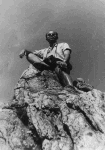
In 1950 in the house of the Writers Union in Zakopane I met a
certain fat gentleman and one day we went for a walk to the Czarny Staw.
My companion was Jerzy Panski from the "Czytelnik" publishing house but
I did not know it at that time. During our trip we talked about the absence
of polish science fiction... Panski asked whether I was capable of writing
such a book. I answered "yes" - not knowing who my companion was, thinking
it was just an ordinary fat fellow who happened to be staying at the "Astoria",
just as I was. After some time, to my great surprise, I received an author's
agreement from "Czytelnik". Having no idea what the book will be about
I filled in the blank space with the word "Astronauts"... and in a quite
short time I wrote my first book that was soon published.

